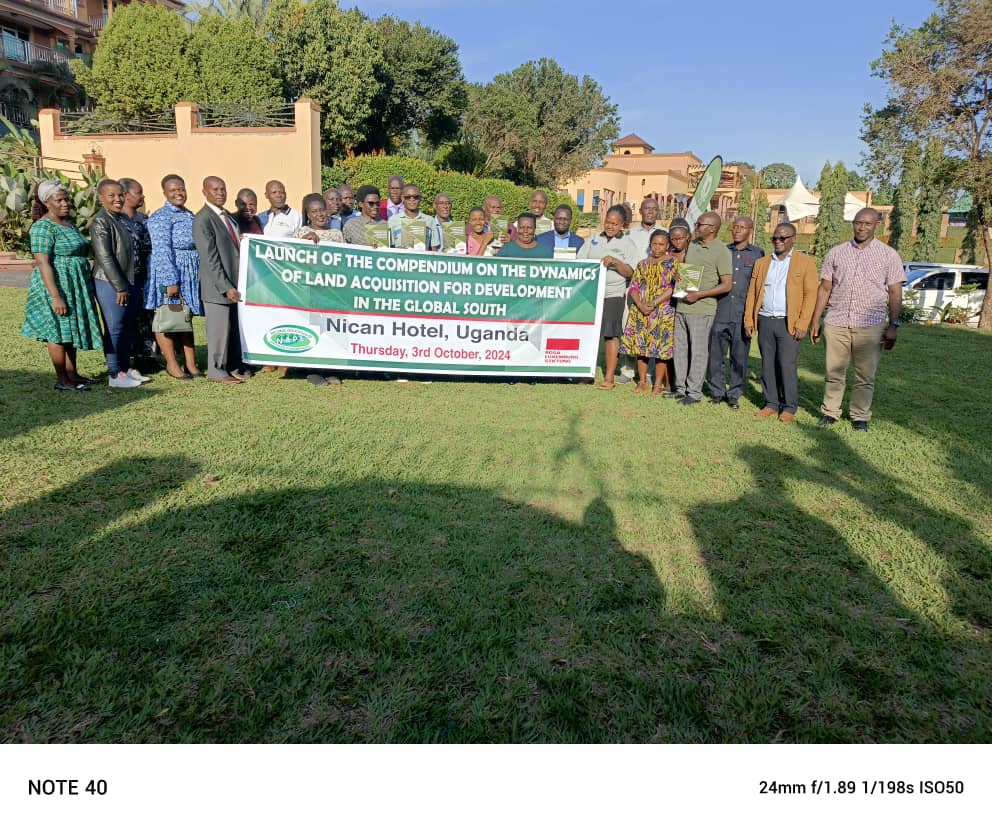Tuesday, October 8th, 2024 | By

National Association of Professional Environmentalists (NAPE) has launched a compendium on the dynamics of land acquisition for development in the global south with a call for a model of development that benefits local people.
The compendium, that was launched at Nican Resort Hotel on October 3rd, involves thematic topics on historical, ongoing and emerging land questions relating to how land is acquired for large land-based investments. It is a product of intellectual study group sessions on Land and Natural resource that NAPE has been convening since January 2023, comprising of Rosa Luxemburg Foundation partners in Uganda as well as other civil society actors, academicians, journalists and opinion leaders.
During the launch, the Executive Director, Mr. Frank Muramuzi noted that local people’s land is being grabbed in the guise of development by government and investors. He noted that globally, especially in African countries and Uganda in particular, a few powerful individuals both multinational and domestic acquire land that rightfully belongs to the local people for large plantations and extractive industry leaving the host communities impoverished.
Mr. Muramuzi said a people-centered model of development that fulfills human rights and protects the environment is urgently needed.
Mr. Richard Mugisha, a Researcher, argues that land titling is a new form of land grabbing that is being used by development actors to grab land. He said that there is a continuous push for individual land ownership and land titling as opposed to customary land ownership to make it easy for actors to grab land from individuals.
Mr. Mugisha noted that political elites have acted as an umbrella for the land grabbers hence making the communities suffer not only due to lack of knowledge in regards to their rights but also because the laws and policies do not cater for protection and reservation of these rights.
“Customary land that involves many people is hard to put in the market. But with a land title, one can easily be put to corner to easily sell,” said Mugisha
Mr. Muhamed Lunyango, a scholar at Makerere Institute of social research explained that with land titles, the land is being taken over forcefully by replacement, leasing or being bought cheaply in the name of development hence violating human rights of existence of the locals and right of the ownership of land. He said with individual ownership, one can easily be convinced to give away land at a cheaper price compared to when it’s a community living on the land customarily.
“Our focus should not be on ownership alone; whether a man or a woman owns land individually, but rather on whether the claims we have on a land as a collective- man, woman, and children- are protected. Because owning land as an individual makes us a target for land grabbers who have an assumption that those communities must let go of their land, for which they must accept the monetary equivalent of the same,” Mr. Luyango explains.
Mr. Joram Basiima, a resident of Kigaaga village in Hoima district said they are already experiencing land grabbing by development actors who pay them little money.
“In our communities, we are already experiencing land grabbing by carbon trading companies like Tree for Global benefits, New Forest Company and Green Resources among others, who make us sign documents we don’t understand and end up giving us little money and taking charge of the forest. They came into our communities of Kikuube and Hoima districts obtaining land from people who are living on the land adjacent the river line forest. They gave them some little money, 6 million shillings which could not even buy half an acre. And they were threatening people that they must sell to them or suffer a lot with government,” said Mr. Basiima.
It is on this note that Mr. Muramuzi called on communities to start collectively registering the land and also start processing their land titles as a community or a family to be able to protect themselves from land grabbers who take advantage of individual land ownership.
To read more about the compendium, follow this link: https://www.greenradio.ug/download/nape-compendium-report/
STORY COMPILED BY PRECIOUS NATURINDA AND ADRINE TWONGIRWE
Copyright ©2025 Community Green Radio . All Rights Reserved. Designed : Lwegatech